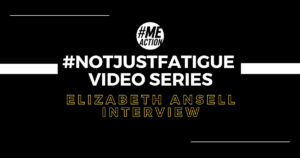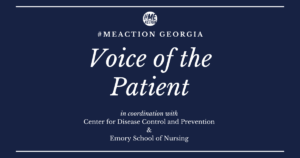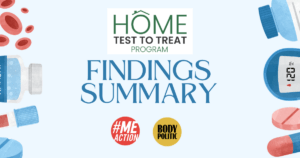Hope 4 ME & Fibro Northern Ireland ran their Chasing Competent Care conference and #MillionsMissing protest on Monday 6th June in The Stormont Hotel, Belfast. The conference delivered a strong message calling for change to the currently inadequate care situation for ME and fibromyalgia patients in Northern Ireland, and featured a display of shoes as part of the #MillionsMissing campaign.
Over 200 pairs of empty shoes were lined up to the side of the speakers’ podium. Each pair of shoes carried a tag with the name of a patient unable to participate in their once-active lives due to ME and/or fibromyalgia. During the conference many attendees read the comments on the tags that described the devastation caused by these largely forgotten and ignored conditions.
Chairperson Martina Marks opened the meeting, welcomed everyone and thanked the Big Lottery Fund for their sponsorship of the event. Her welcome was followed by a plea from Joan McParland, the founder and treasurer of Hope 4 ME & Fibro NI, to have medical professionals take patients’ symptoms seriously. Joan explained that she had been ill and operating at less than 30% of her normal capacity since 1999. In that time no effective treatments had been offered, and one consultant had even suggested she was simply reading too much into her symptoms and that she should see a psychiatrist.
Joan thanked the many volunteers and family members who made the event possible, and also the medical professionals and MLAs in the audience for taking time to attend.
Sally Burch, another charity trustee, then pointed out that ME (myalgic encephalomyelitis) and fibromyalgia are both disorders recognised by the World Health Organization. She then explained that the most severely affected by ME could be left bedbound, tube-fed, and lying in darkened rooms for weeks, months and even years. She further described the severely debilitating nature of fibromyalgia and how the invisible pain that sufferers endure can have devastating life consequences. Sally outlined the symptom overlap between these conditions and suggested that biomarker development and medical research is urgently required.
The first speaker was Dr Joe McVeigh, who outlined the problems with exercise and fibromyalgia. He explained that while exercise is important for maintaining health, that it must be conducted at a level manageable for each individual patient. He called this the “Goldilocks approach”, and explained that at no time should attempted exercise cause a patient to relapse.
Professor Malcolm Hooper next gave a strong talk berating the inadequacies and misleading conclusions of the PACE Trial. At one point, he suggested that the PACE Trial was potentially fraudulent and told us that he had once even said as much in The House of Lords. This elicited a spontaneous round of applause from the audience. Feelings run high amongst patients on the PACE trial, mostly because it has been used to support the NHS recommended therapies of Cognitive Behaviour Therapy (CBT) and Graded Exercise Therapy (GET). A large-scale patient survey has demonstrated that GET in particular causes unacceptable harms to patients.
Professor Hooper questioned the motives of the PACE trial authors in promoting results that carry such marginal benefits and such great potential risks. He recommended that patients reference Mark Vink’s paper, The PACE Trial Invalidates the Use of Cognitive Behavioral and Graded Exercise Therapy in Myalgic Encephalomyelitis/ Chronic Fatigue Syndrome: A Review, any time they were asked to undertake these therapies.
After Hooper’s talk, the conference paused for a comfort break.
Next, Natalie Boulton spoke. Boulton, a carer to her daughter who has severe ME, opened by showing a clip from the video Voices from the Shadows, that gave the audience insight into the annihilation caused by very severe ME. Natalie told us she had recently followed up with some of the patients from the video and found many of them had worsened, and that both Emily Collingridge and Lyn Gilderdale had since died. She spoke of the horror of the treatments doled out by psychiatrists who believed patients to be faking their illness.
Next, Professor Mady Hornig from Columbia University gave a detailed and informative account of her work towards developing blood biomarkers. She explained how immunity and gut microbiota can be linked to the brain, its functioning, and mood. She talked about the epigenetic changes that can occur in the microbiome during a person’s lifetime and the link to serotonin production. She also talked about measuring blood molecules such as cytokines before and after an exercise challenge in ME patients, and comparing these changes to healthy controls, stating that these cytokines are the most promising potential biomarkers.
Dr Pamela Bell then took the podium to talk about the problem with pain. Dr Bell has worked extensively in the field of pain, and is now chair of the Pain Alliance Northern Ireland. She emphasised the widespread nature of chronic pain and its disabling effects, noting that once pain becomes chronic it no longer serves a useful purpose in the body. She recognised the difficulties with effectively treating ongoing pain and explained that different types of pain needed different drug types to alleviate symptoms.
The final speaker of the evening was Louise Skelly from the Patient and Client Council of Northern Ireland. She spoke of her frustration at trying to bring about change to the current impasse with Health and Social Care Board in Northern Ireland regarding the care on offer for ME and fibromyalgia patients. She spoke of her determination to follow through with the campaign to improve the situation, and of the great need of these neglected patient cohorts.
Martina Marks then brought the conference to a close. As the hall emptied, the lines of shoes from the #MillionsMissing campaign were gathered up, their labels still attached, an attendee said, “These are the folk we do all this for. They will not be left forgotten any longer.”

#NotJustFatigue Video Series: Interview with Creator Elizabeth Ansell
Over the past year, the #NotJustFatigue website, created by Elizabeth Ansell, releases a 10-part, documentary style, short form video series on different aspects involved in living with ME. Titles of the videos include topics such as: You Have No Idea How Serious This Is, Nobody Believes ME, and It’s Not Hysteria: It’s Sexism. In these





2 thoughts on “N. Ireland: Chasing Competent Care and #MillionsMissing protest”
Do you know whose quote that is in the picture?
That is a quote from Professor Malcolm Hooper, Justin. 🙂
Comments are closed.